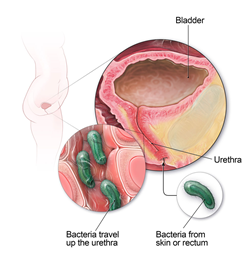Posted 29 September 2017
 The
urinary tract is composed of the urethra, bladder, ureters and kidneys. The
blood is filtered through the kidneys to remove waste products and excess
water, forming urine. This then travels along the ureters to the bladder, where
it is stored until the person passes the urine out of their body via the
urethra.
The
urinary tract is composed of the urethra, bladder, ureters and kidneys. The
blood is filtered through the kidneys to remove waste products and excess
water, forming urine. This then travels along the ureters to the bladder, where
it is stored until the person passes the urine out of their body via the
urethra.
Urinary
tract infections (UTIs) can occur in any of these four areas. Depending on the
location, the infection may be labelled as urethritis (urethra), cystitis
(bladder), ureteritis (one or both ureters) or a kidney infection. (1)
Classic
symptoms include a frequent, urgent need to pass urine (often in small
amounts), a stinging or burning pain when passing urine, and lower abdominal
pain. However, the urine may also contain blood and may have an unpleasant
smell and/or a cloudy appearance. The person affected may feel generally
unwell, and elderly sufferers sometimes even experience confusion. (1)
What causes UTIs?
The most
common cause of a UTI is when faecal bacteria such as E. coli from the back passage get into the urethra. This happens
more frequently in women than men, because there is a shorter distance between
the openings of the urethra and back passage. Furthermore, the urethra itself
is shorter in women, meaning the bacteria don’t have as far to travel to reach
the bladder and higher portions of the urinary tract, leading to infection. (1)
The urinary tract is usually a sterile (bacteria free) environment, so it can
be quickly overwhelmed by invasive bacteria which have no competition for space
and nutrition.
Other
causes include conditions in which block part of the urinary tract, such as
kidney stones; an enlarged prostate in men, which can make complete emptying of
the bladder hard; a poorly functioning immune system, which increases a
person’s susceptibility to bacterial infections; using a catheter; and
pregnancy. (1)
How are UTIs treated?
For
women, sodium or potassium citrate
sachets are available that can be used at the first sign of a UTI. They help to
reduce the acidity of the urine, therefore easing symptoms while the body
fights the infection. One sachet is dissolved in a glass of water and taken
three times a day for two days. If the symptoms persist or recur after this
course, a GP appointment must be made as antibiotics may be needed to clear up
the infection.
Men,
pregnant women and children must be booked in to visit their GP upon the
development of any UTI symptoms. Anyone with lower back or side pain, a raised
temperature, chills, nausea, vomiting or diarrhoea related to a UTI should make
an emergency appointment with their GP, as the infection may have spread up the
urinary tract to the kidneys, which will need urgent treatment. (1)
Trimethoprim is the antibiotic of first choice for
simple UTIs affecting the urethra and/or bladder. Nitrofurantoin, cephalosporins
or norfloxacin can be used as an
alternative if the former is unsuitable, or the higher portions of the urinary
tract are affected. Courses of antibiotics must always be completed, even if
symptoms have ceased, otherwise the infection may not be fully treated and may
recur.
Paracetamol may also be taken for pain relief. (1)
Can UTIs be prevented?
There is
no failsafe way to prevent UTIs, but there are steps that can be taken to make
developing a UTI less likely. Always wipe from the front to the back after
using the toilet, to prevent transfer of faecal bacteria to the urinary tract.
Wear loose fitting, breathable underwear and try to use fragrance free body
washes and soaps in the intimate area. Drink plenty of water, try not to hold
in urine for too long and be sure to completely empty the bladder when you go
to the toilet. Also, pass urine as soon as possible after sex to flush out any bacteria
that have entered the urethra. (1)
If,
despite following these steps, you still suffer with recurrent UTIs, your
doctor may prescribe low dose antibiotics to help keep them at bay, or refer
you to a specialist for further investigation.
National
Health Service. Urinary tract infections (UTIs) [cited 24 September 2017].
Available from: https://www.nhs.uk/conditions/urinary-tract-infections-utis/
Author: Gabby Gallagher MPharm
Medically reviewed by: Superintendent pharmacist Margaret Hudson BSc(Hons)MRPharmS 26/09/17
Posted in Men's Health, Sexual Health, Womens health